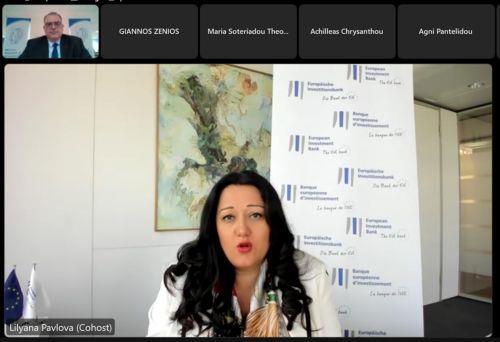31.06.2022
The EU and Cypriot economies are facing a “double challenge” of rising commodity and energy prices and increased uncertainty following Russia’s invasion of Ukraine, according to a conference held by the Nicosia Chamber of Commerce and Industry and the European Investment Bank (EIB).
“The war does threaten the EU economy with double whammy due to the continued soaring energy prices, rising inflation and huge uncertainty,” EIB Vice President Liliana Pavlova said at a virtual conference on Monday, adding that “we are moving towards a new normal.” life.”
She said that the EIB has a large portfolio of projects for Cyprus, confirming “our strong commitment and willingness to work as a reliable partner for Cyprus”.
“In the current circumstances, we can determine what this new emerging environment will look like, how European businesses and how Cypriot companies will position themselves in the new environment, and a lot will depend on investment.”
Cypriot Finance Minister Konstantinos Petrides recalled his address to the Cypriot Parliament at the end of 2021 regarding the state budget for 2022, when he noted that “we must be prepared for the next crisis.”
“And indeed, it happened earlier than expected with the Russian invasion and sanctions,” he said.
Petrides is optimistic that Cyprus will mitigate the effects of the crisis, especially the loss of Russian tourists to Cyprus, who make up 20% of the island’s tourism product, by creating alternative destinations from other European markets.
“Bookings have already reached 75% of 2019 bookings,” he said.
But he noted that “more of a concern is inflation,” noting that energy prices in many countries are reminiscent of the 1973 oil crisis.
“We are close to a double-digit increase in inflation due to rising energy prices in most European countries, which will definitely affect the demand and supply of goods and services,” he said.
The Minister of Cyprus stressed the need to implement the National Recovery and Resilience Plan, using 1.2 billion euros, which will have a multiplier effect on the economy.
“We need to work together with banking institutions and the private sector to use these funds as quickly as possible,” he added.
For his part, Konstantinos Herodotou, Governor of the Central Bank of Cyprus, said that the bank had lowered its forecasts for Cypriot GDP growth to 2.3% of GDP in 2022, compared to 3.6% in the previous forecast for the end of 2021.
“This impact is due to rising prices for oil and other commodities, as well as the disruption of exports of goods and services to Russia, which on average is about 16% of total exports of goods and services,” he said.
He noted that the medium-term economic outlook for Cyprus remains positive with a $1.2 billion EU recovery and resilience funding.
What’s more, inflation is expected to register a “significant rise” that is estimated to rise to 6.7% in 2022 from 2.5% originally estimated.
However, the CBC governor said that Cypriot banks are entering the crisis in a better position, as their fundamentals have “tangibly improved”.
Christodoulos Angastiniotis, president of the Cyprus Chamber of Commerce and Industry, said the chamber “strongly pushes for the introduction of an enterprise support scheme to provide government-guaranteed loans.”
“Priorities have certainly changed as the main concern of the business sector now is how to overcome liquidity problems and ensure their survival,” he said.
He also noted that it is “extremely important for us to make the best use of” the 4.2 billion euros that will be delivered to Cyprus through the EU Recovery Plan and Structural Funds.
Opening the conference, Michalis Musioutas, President of the Nicosia Chamber of Commerce and Industry, said that “Cyprus, along with the rest of Europe, is experiencing an unprecedented amount of upheaval in the 21st century.”
“As we tried to get out of this first big shock from the pandemic, which has dealt a severe blow to our economy, the war in Ukraine has further worsened the situation, creating additional problems for the business sector, which is experiencing exceptional energy costs, breaking the price increase . in supply constraints and sustainability,” he added.
















